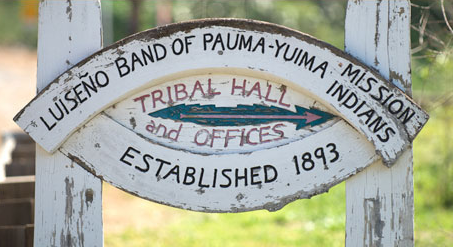
The San Luis Rey Band of Mission Indians filed a lawsuit and a temporary restraining order on Friday against Palomar College in San Diego County Superior Court in Vista. The injunction requests Palomar to cease construction on the college’s main road, Horse Ranch Creek Road, to the Fallbrook campus and some three large housing and commercial projects that are planned at the intersection of Highway 76 and Interstate 15. San Luis Rey filed the injunction just after grading activities resulted in inadvertent discoveries of human remains, significant archaeological resources and distinct archaeological sites.
Despite the knowledge of the site’s well-documented historical significance, San Luis Rey’s filing and new “inadvertent discoveries” of human remains and significant archaeological features during grading, Palomar College continued its construction activities. Palomar did not cease disturbances, did not consult with tribes, and did not revise its plans or agreements despite the new “discoveries.”
The Army Corps of Engineers (ACE) issued a Section 404 Permit which allows the project to proceed despite potential impacts to wetlands within the project’s footprint. Because the project relies on a federal permit, federal law applies to the project.
“We have no choice but to join the San Luis Rey Band and halt this illegal and immoral action of unearthing our ancestors without following the law and protocol that applies to these types of projects,” said Bennae Calac, Pauma’s Repatriation Officer and Secretary/Treasurer of Pauma’s Tribal Council. Ms. Calac further explained that “[i]n this case we have the domino effect of poor project management and compliance: failed tribal consultation, insufficiently scoped archaeological assessments, erroneous conclusions in the Environmental Impact Report (EIR), data recovery based on an unapproved, unofficial Data Recovery Plan, zero evidence of a curatorial services agreement that complies with the Archaeological Resources Protection Act of 1979 that governs the repository and long term curation of the archaeological resources collection and Section 110 of the National Historic Preservation Act which governs the federal agency duty to observe historic preservation practices, and the list goes on and on. Despite the fact that we have Native American monitors onsite, we remain concerned that the licensed archaeologists that have given the green light to continue grading and cause irreparable harm to the site are acting too hastily. The grading and resource extraction is occurring more quickly than the archaeologists can identify and assess the resources. Further, the resources are being boxed and left onsite. If archaeologists are unable to keep up with the inventory and assessment of the collection as it is being discovered and if archaeologists opt to use a repository or curation facility not properly staffed or otherwise inadequate (such as a temperature controlled environment), then those very archaeologists and perhaps even Palomar College have done a great disservice to the people of California, the tribes that have and continue to provide guidance, and the descendents of those buried. The Palomar project sets a dangerous precedent in the archaeological profession that is contrary to local, state, tribal and federal regulations drafted to protect and learn from the archaeological record.”
The proposed injunction would allow an appropriate modification of the grading permit, in the least, to address the inadvertently found human remains and resources, as well as allow for overdue tribal consultation to take place and an appropriate curatorial services agreement be secured.
Ms. Calac concluded “[i]f the process was conducted correctly, an injunction would not be necessary.”
Rodeo season may be wrapping up in Cheyenne, Wyoming, but the excitement is just beginning!… Read More
The 2025 Hondo Rodeo Fest is right around the corner and rodeo’s best athletes aren’t… Read More
The heart of Arizona’s cowboy country beats louder than ever as the Kingsmen bring back… Read More
Rocky Point, Mexico - As excitement builds for the October Country Fest, Cowboy Lifestyle Network… Read More
Calling all rodeo fans! Are you looking for something fun and exciting to do this… Read More
NASHVILLE, Tenn. – The Austin Gamblers rode into Nashville and did what no one else… Read More
This website uses cookies.
Read More